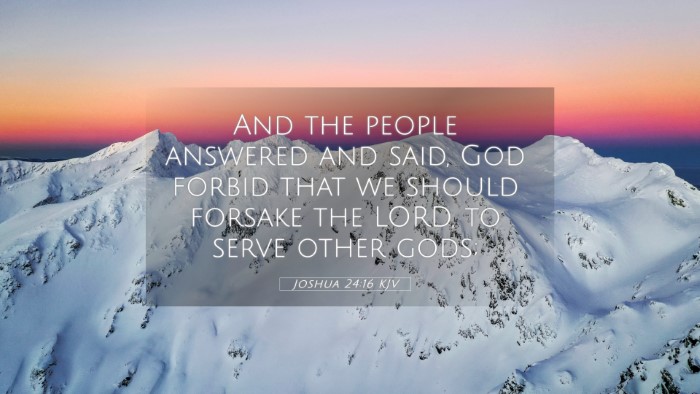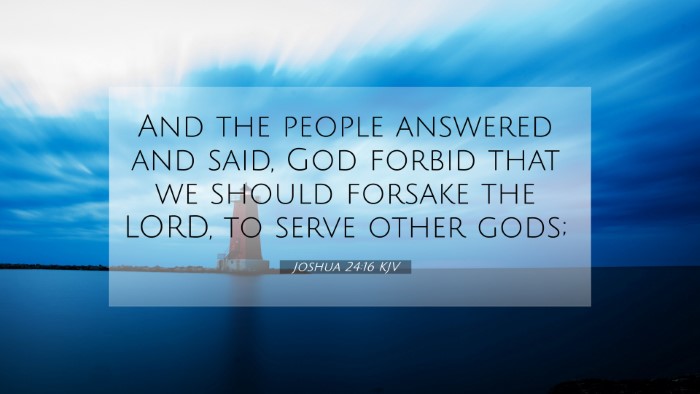Bible Verse Meaning: Joshua 24:16
Bible Verse: "And the people answered and said, God forbid that we should forsake the Lord, to serve other gods;" (Joshua 24:16)
Summary of Meaning
This verse is part of Joshua's farewell address to the Israelites, emphasizing the importance of loyalty to God. The people's response reflects their commitment to serving the Lord and rejecting idolatry. The verse articulates a key theme in Israel’s covenant relationship with God, where fidelity to Him is foundational for their identity and mission as a people.
Commentary Insights
This section synthesizes insights from Matthew Henry, Albert Barnes, and Adam Clarke’s commentaries on this verse.
Matthew Henry's Commentary
- The Loyalty of God's People: Henry emphasizes the sincere dedication of the Israelites. Their response demonstrates a collective recognition of God's supremacy and a firm resolve to avoid any form of idolatry.
- The Consequences of Forsaking God: Serving other gods not only indicates unfaithfulness but also invites divine wrath and societal decay, as seen throughout Israel's history.
- Importance of Public Acknowledgment: The gathered assembly signifies the communal aspect of faith—worship is not merely personal but shared among the people.
Albert Barnes' Commentary
- Divine Revelation: Barnes notes that the people’s response indicates an understanding of God's past deliverance and the need for ongoing faithfulness.
- Historical Context: The verse is set within a pivotal moment; the Israelites are reminded of their history with God prior to making a covenant commitment.
- Faithfulness Within Trials: This statement reflects a solemn commitment to remain steadfast amidst potential future challenges and诱 temptations.
Adam Clarke's Commentary
- Collective Confession: Clarke points out the significance of the people's answer as a mutual commitment, highlighting the need for community in spiritual accountability.
- Rejection of Idols: The statement acts as a repudiation of other gods, demonstrating a clear line between faithfulness to God and fallenness into idolatry.
- The Covenant Relationship: Clarke emphasizes that the reflection on past acts of God serves as a basis for the current commitment and signifies the relational aspect of biblical worship.
Cross References
The following verses relate closely to the themes presented in Joshua 24:16:
- Exodus 20:3: "You shall have no other gods before me." - This highlights God’s commandment against idolatry.
- Deuteronomy 6:13: "You shall fear the Lord your God, and serve him..." - Emphasizing fear and service to God as foundational principles.
- 1 Kings 18:21: "How long will you go limping between two different opinions?" - A call for commitment in service to God alone.
- Joshua 22:5: "But take diligent heed to do the commandment and the law, which Moses the servant of the Lord charged you..." - Encouragement to remain faithful to God's commands.
- Romans 12:1: "Present your bodies as a living sacrifice, holy and acceptable to God..." - A New Testament call to commitment and service to God.
- Hebrews 10:23: "Let us hold fast the confession of our hope without wavering..." - Encouragement to steadfastly hold to faith.
- John 14:15: "If you love me, you will keep my commandments." - The connection between love for God and obedience.
Thematic Connections
Joshua 24:16 calls for analysis within broader biblical themes and connections, including:
- Faithfulness and Idolatry: Explored from Exodus through Revelation, showing the perpetual theme of loyalty to God versus idolatrous practices.
- Covenantal Theology: The importance of agreement and commitment to God's established covenants throughout the scriptures.
- Community Responsibility: The understanding that faith is communal; individual commitment plays a part in the larger body of believers.
- Historical Remembrance: The act of remembering God's past deeds as a means to fortify future fidelity.
- Divine Authority: Recognizing God's sovereignty and rightful authority in the lives of believers.
Conclusion
Joshua 24:16 serves as a poignant reminder of the Israelites' commitment to God and stands as a call for believers today to reflect on their loyalty. This commitment is reinforced through scriptural exploration and cross-referencing, revealing how interconnected the scriptures are in guiding and shaping the believer's faith journey.
Tools for Further Study
For those seeking to delve deeper into cross-referencing biblical texts, the following resources may be beneficial:
- Bible Concordance: An essential tool for finding keywords and exploring their occurrences throughout scripture.
- Bible Cross-Reference Guide: A structured method for linking verses thematically or contextually.
- Cross-Reference Bible Study Methods: Techniques for exploring scriptures through comparative analysis and thematic connections.
- Comprehensive Bible Cross-Reference Materials: Resources that compile extensive cross-references for in-depth study.






